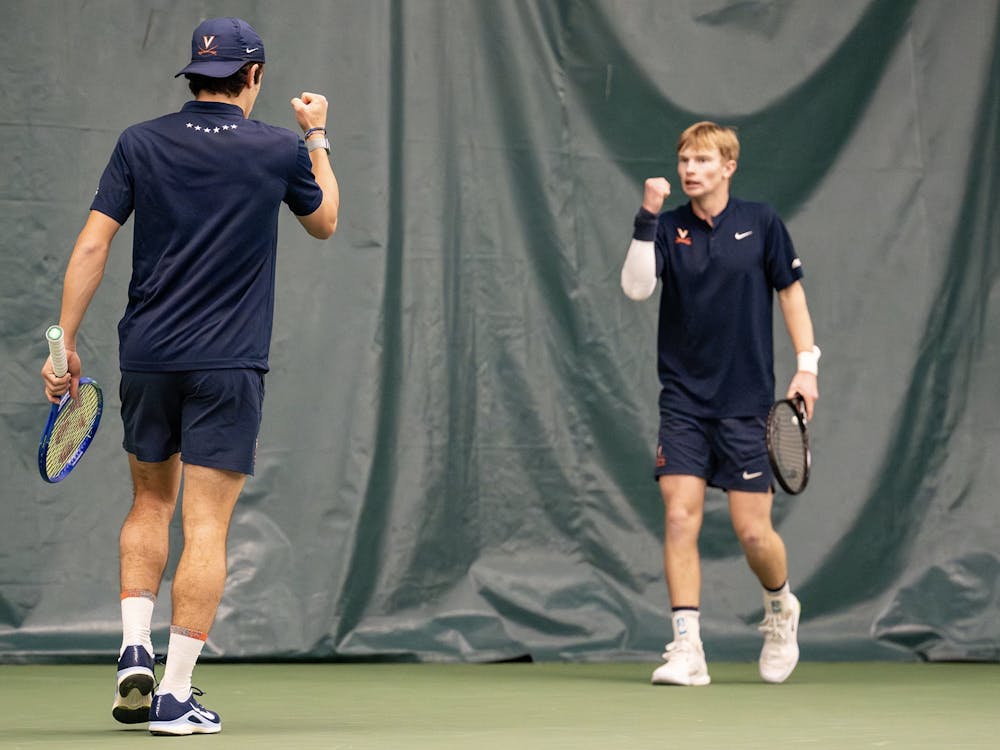Virginia had a chance to establish itself as a top 10 program Saturday and prove it is on the same level as the Florida powerhouse football schools. While the Cavaliers drastically improved from their effort at Florida State a month ago, they ultimately proved that they're not there yet. And what the team sorely lacks is the big play.
The first downs were virtually even. The third-down conversion percentage was 41 percent for both squads. The Cavaliers even outrushed Miami by 18 yards. Where they fell behind was in the big plays in the passing game and on special teams.
The Virginia receivers caught only one pass all game -- a four-yard reception by Deyon Williams. Junior tight end Heath Miller had a solid game -- catching three balls for 45 yards and a touchdown, including a 30-yard catch in the third quarter that led to Virginia's second touchdown. But if your receivers pose no threat, especially to stretch the field vertically, defenses can put eight in the box to stop the run and focus exclusively on stopping Miller.
Virginia only attempted one deep ball to a wide receiver all afternoon -- a Hagans toss to Michael McGrew near the right sideline in the first quarter. McGrew dove to try to make the difficult catch, but couldn't come up with it.
Miami receivers, meanwhile, caught seven passes for 79 yards, including a 25-yard strike on fourth down from Brock Berlin to Roscoe Parrish with 51 seconds left to ice the game for the Hurricanes.
But the biggest play of them all for Miami came a few plays earlier on third and five with under three minutes to go. The Hurricanes had the ball on their own 35-yard line and were up just 24-21. Berlin completed a flat pass to a wide open Talib Humphrey for about four and half yards, which Humphrey took 34 yards down the Virginia 31.
"It was a mental error; it was on my part," senior safety Marquis Weeks said. "I thought that I had one guy and I had the guy that caught the ball. ... That makes it even more disappointing for me -- to lose the game on a mental error."
On the special teams front, Virginia had been getting by with a shaky punt unit all year and it finally came back to bite them. Parrish returned a low, line drive 37-yard punt off the foot of Sean Johnson 62 yards to the house to give Miami a 24-14 lead with seven minutes left in the game.
"Our defense, we didn't get any turnovers," Weeks said. "You need big plays to win games like this. You need your defense to maybe score points and get some takeaways and we didn't do those things. You need your offense to make big plays on offense and we had some explosive plays, but against a team like Miami, you just need more."
The big play is a great thing. In a second it turns momentum completely in your favor and leads to points on the scoreboard. While Virginia had been able to make those plays early in the year against inferior opponents, it has not been able to make them against top 25 teams. Amazingly, Virginia still has yet to beat a team with a winning record. Whether it's making big plays or not giving them up, the Cavaliers need to find ways to obtain and limit large chunks of yardage. You can't and don't deserve to win games if you only have one completion to a wide receiver for four yards.
But there is room for hope. Virginia's ACC title chances are not dead. It is encouraging that the Cavaliers were one play away from taking over the ball, with two timeouts and over two minutes left, against a Hurricanes team which had lost two games in a row and desperately needed to win. A turnover or crucial stop on defense, a long return on special teams or even a deep ball down the field could have tipped the game in Virginia's favor. But until those game-changing plays happen, Virginia will continue to look up in the standings to schools like Miami and Florida State.






